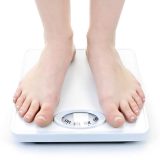An estimated two thirds of American adults are considered to be overweight or obese. This staggering statistic fuels the search for weight loss solutions, preferably ones that are quick and easy. Appearing to fit the bill of a quick and easy weight loss plan, an increasing popular approach relies on hCG, a pregnancy hormone. Dubbed the “pregnancy hormone diet,” the promise of losing one to three pounds per day has many diet-seekers inquiring further about the validity of this weight loss strategy.
About hCG
The acronym hCG stands for human chorionic gonadotropin, a hormone produced during pregnancy. hCG is:
- made by cells in the placenta
- is believed to mobilize abdominal fat to help nourish the fetus
Using hCG for weight loss dates back to the mid 1950s. It was then that British physician A.T.W. Simeons proposed the idea that this hormone could speed the metabolism of dieters just as it does for expectant mothers. The pregnancy hormone diet combines injections of hCG (requiring a physician’s prescription) with a daily intake of just 500 calories. Simeons touted hCG as a potent appetite suppressant that would make anything more than 500 daily calories unbearable, claiming the hormone could blast fat in key trouble spots like the upper arms, stomach, thighs and buttocks, while preserving muscle.
To capitalize on this craze without the prescription injection, there is also an oral form of hCG being sold. However, experts insist that the oral version is useless, as most products don’t seem to contain any hCG at all. Even if an oral preparation did have hCG present, the hormone is broken down by the digestive system rendering it useless anyway.
The Flurry of hCG Downfalls
Finding a magic bullet for weight loss or an injection that suppresses the appetite may seem like the answer to many dieters’ prayers. Although the pregnancy hormone diet may legitimately help people lose a lot of weight fast, it is far from advisable.
The biggest problem with this weight loss strategy is the requirement to restrict daily caloric intake to 500 calories. hCG isn’t some miracle ingredient for weight loss; rather, the restrictive diet is responsible for the loss of weight. Most authorities consider 500 calories a day to be akin with starvation. On discussing the hCG diet, Pieter Cohen, an assistant professor of medicine at Harvard Medical School, says “It’s reckless, irresponsible, and completely irrational. Can you lose weight on it? Of course, but that’s mainly because you’re hardly consuming any calories. And any benefit is not going to last.” Consuming just 500 calories a day will cause malnutrition. Health experts advise dieters to have at least 1,200 per day – as extremely low-calorie diets can cause severe bone and muscle loss, electrolyte imbalances, gallstones and even death.
As if starvation was not enough of a deterrent, hCG can be responsible for the following side effects:
- headaches
- blood clots
- leg cramps
- temporary hair thinning
- constipation
- breast tenderness
Although there initially appears to be a handful of hCG diet success stories, there are even more reports of hCG diet problems. According to registered dietitian Keri Gans, a spokesperson for the American Dietetic Association, “I’ve heard a lot of people say the side effects of this diet are overwhelming. And they could start as soon as one day in – you’ll start feeling irritated and tired.”
Even if the dieter is successful in quickly dropping pounds, the weight will almost always return. A common occurrence with yo-yo dieting, the body will overcompensate for its starved state upon the diet’s completion. At that point, more weight than was initially lost typically returns. According to Kathleen Zelman, MPH, RD, director of nutrition for WebMD, when calories consumed are so close to starvation level, the body not only burns fat, but also burns muscle mass for fuel. The last thing any dieter needs is to lose muscle mass, because that is what keeps metabolism at its best. Starvation diets not only cause fat and muscle loss; when the weight lost returns, it usually returns as all fat.
Gans, along with a majority of health professionals, describes a more sensible and lasting route to weight loss as choosing healthy foods, limiting portion sizes and exercising. When it comes to shedding extra weight, there is no magic bullet. The pregnancy hormone diet initially appears to be a good bet for dropping several pant sizes, but the loss is temporary. Even worse, the hormone or the caloric restriction could cause the dieter serious harm.
Likely a reflection of our nation’s high rate of overweight and obese adults, using hCG for weight loss is at an all time high. Regrettably, those who have been convinced that the pregnancy hormone diet is their ticket to a thinner body are sadly misinformed. Don’t starve yourself and risk various aspects of your health for a temporary weight reduction. Upon looking at what this diet is really about, it is perfectly clear that hCG coupled with starvation goes beyond being just a craze – it’s crazy.




